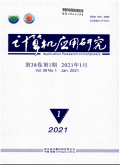计算机应用研究2024,Vol.41Issue(6):1833-1839,7.DOI:10.19734/j.issn.1001-3695.2023.10.0536
非完美频谱感知下认知超密集网络的资源分配
Resource allocation of cognitive ultra-dense network with imperfect spectrum sensing
摘要
Abstract
Aiming at the situation of imperfect spectrum sensing of cognitive radio in actual cognitive ultra-dense network sce-narios,this paper proposed a resource allocation scheme based on imperfect spectrum sensing.The target was to maximize the energy efficiency of secondary network in cognitive ultra-dense network with imperfect spectrum sensing while taking into ac-count cross-tier/co-tier interference constraints and ensuring users'quality of service.And this paper constructed the energy efficiency optimization problem based on the network model,which was a mixed integer non-convex programming problem,then transformed it into an equivalent convex optimization problem by the time-sharing relaxation method and Dinkelbach me-thod,and finally used the Lagrangian dual method to get its optimal solution,thereby obtained the sub-channel and power allo-cation strategy for optimal energy efficiency.Based on this,this paper proposed an iterative sub-channel and power allocation algorithm.In order to trade off the computational complexity,this paper also proposed a practical sub-channel and power allo-cation algorithm.Simulation results show that the proposed algorithms effectively improve energy efficiency.关键词
非完美频谱感知/认知超密集网络/跨/同层干扰约束/能效Key words
imperfect spectrum sensing/cognitive ultra-dense network(UDN)/cross-tier/co-tier interference constraint/energy efficiency分类
电子信息工程引用本文复制引用
李凡,仇润鹤..非完美频谱感知下认知超密集网络的资源分配[J].计算机应用研究,2024,41(6):1833-1839,7.基金项目
上海市自然科学基金资助项目(20ZR1400700) (20ZR1400700)

